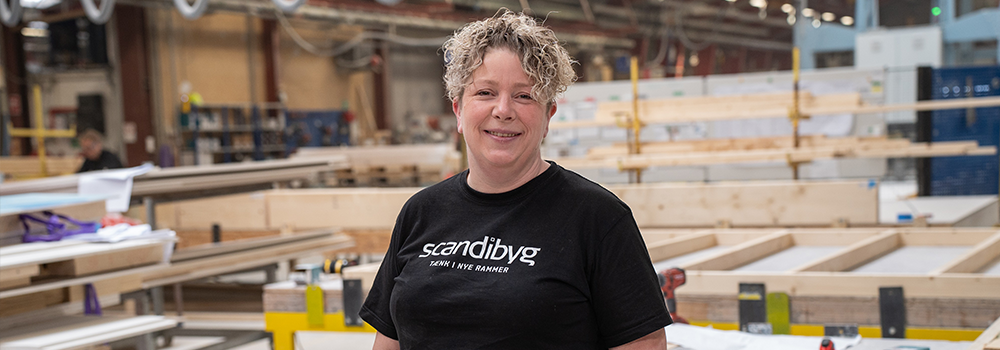
Scandi Byg wants more women in the construction industry
Scandi Byg has just become an active corporate ambassador for Boss Ladies, who fight to create better conditions for women at vocational schools and in industries such as the construction industry. The ambassadorship will help attract more female talent to Scandi Byg’s production halls, where a good ten percent of the employees are women – one of them is Mai-Britt Frimor, who would like to see even more women in the profession.
The building and construction industry has historically been an industry where the majority of employees are men. 9.3 percent of the employees in the construction industry in 2012 were women, while the figure was 10.2 percent in 2022. Thus, there has been no notable development in the number of women in the industry in recent years.
But Scandi Byg would like to influence that trend. The module manufacturer has therefore actively entered the fight to attract more women to the construction industry and has joined as an ambassador for the national project Boss Ladies – an organization that works to attract more female talent to the technical subjects of vocational education and to job functions in areas such as construction and the construction industry.
Currently, ten out of the 130 or so employees in Scandi Byg’s production halls are women. One of them is production employee and training coordinator Mai-Britt Frimor, who has been employed by the company for eight years. And although she values competences the most, Mai-Britt Frimor is happy that there is more focus on getting more women to the company in Løgstør.
– I actually have an office degree, but I soon found out that it was not the right thing for me. After a few years with a window and door manufacturer, I joined a course that Tech College made in collaboration with Scandi Byg. Here I was trained in modular construction and after an internship period I got permanent employment in a team with 22 employees who made scavengers, Mai-Britt Frimor says and continues:
– Since then, I have had the opportunity to try many different areas in the company, and today I have ended up in an exciting role where I am in production, but I am also a training coordinator responsible for training the new hourly employees in areas such as the working environment, safety rules and control charts.
The professional competences must not be forgotten
Although Mai-Britt Frimor has experienced many positive changes in the fact that more women have entered Scandi Byg’s production halls, and she would like to be part of the fight to get more of her own gender into the construction industry, it is important to her that that the professional competences are not forgotten.
– There are certainly advantages to having a workplace where there are not only men or women. Among other things, I can feel that the social framework has expanded after we have become more women. There has been a better tone, and there is room to open up to her colleagues, says Mai-Britt Frimor and adds:
– Ultimately, however, I believe that we must employ the employees who have the best qualifications. But here Boss Ladies is also an excellent initiative, because they are fighting to get more female talent into vocational training, and it is the first step on the way to even more skilled women in my industry.
Scandi Byg’s production manager Henrik Lundgaard Jensen completely agrees with that philosophy, and he is excited to see how the development in the number of female applicants will develop in the near future.
– Scandi Byg has good cooperation with municipalities, educational institutions and job centres, where we make it clear that we welcome applications from women with the right qualifications. That and our new ambassadorship in Boss Ladies must create a positive development where the company’s production halls are not considered a male-dominated workplace, says Henrik Lundgaard Jensen and continues:
– We can already see that a diverse workplace provides some exciting dynamics and an even stronger unity in Scandi Byg. We must build on that, and hopefully we will get more female skilled, unskilled and apprentices to the production halls in the future, he concludes.